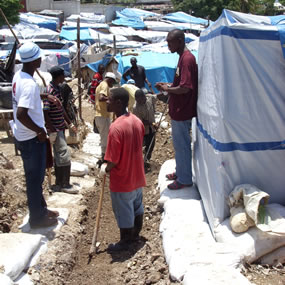
The number of people affected by natural disasters increased to over 250 million in the last decade. 95% of those affected live in the developing world. SOLIDARITÉS INTERNATIONAL integrates the analysis of natural disaster-related risks into its two main domains of intervention, water and food security, in order to better adapt the projects it implements.
In the wake of a natural disaster, SOLIDARITÉS INTERNATIONAL provides an emergency response to help the affected population meet their basic needs: but our intervention goes further than that. From the emergency response phase onwards, we implement activities designed to strengthen the population’s capacity to prepare for and cope with natural disaster, and to reduce the negative impact of a future natural disaster (destruction of agriculture and housing, food stocks, basic infrastructures and access to clean drinking water).
Communities have always had their own ways of coping with disaster, whether flooding, forest fires or drought. They independently develop coping mechanisms – involving solidarity, adaptation and prevention – to reduce the impact of natural disasters on their livelihoods. SOLIDARITÉS INTERNATIONAL therefore works in conjunction with populations to promote a community-based approach to Disaster Risk Reduction.
Together, solutions are found to increase their resilience. These have included the construction of raised latrines in Pakistan and dam rehabilitation in Bangladesh to lessen the impact of flooding; community-based pasture management in Afghanistan allowing more effective protection of natural resources in the face of climate change; the integration of natural disaster-related risk analysis into urban reconstruction projects in Haiti; and the creation of community water management communities in parts of Kenya affected by drought.
